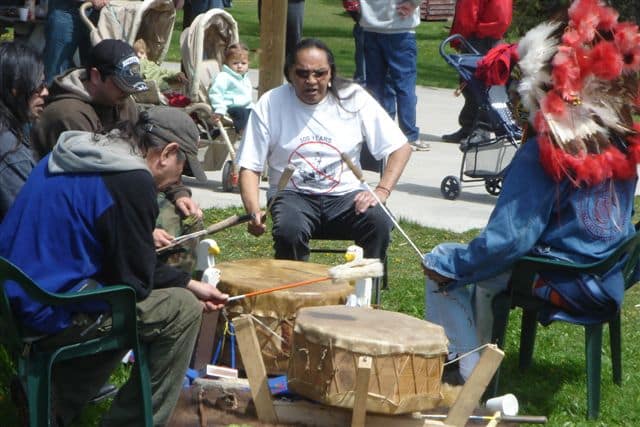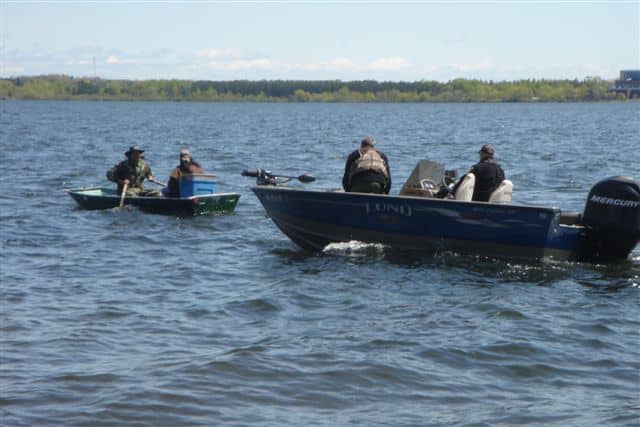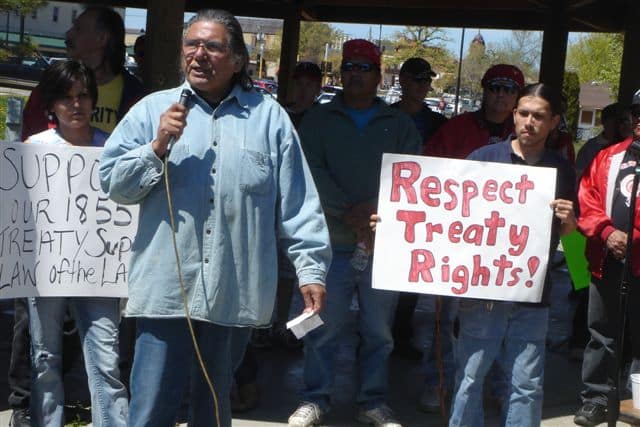On May 14, the day before the Minnesota walleye fishing opener, activists from two northern Minnesota Ojibwe bands exercised what they regard as their right to fish off reservation and outside of the state’s prescribed season. They dubbed their action the “Great Anishinaabe Fish-Off” and held a Stop Treaty Abuse Rally on the shores of Lake Bemidji, a stone’s throw from the city’s trademark statues of Paul Bunyan and Babe the Blue Ox in downtown Bemidji. The title of the event was grandiose in view of the handful who actually challenged regulations by fishing, but that did not detract from the significance of their actions.
The activists were enrollees of the Leech Lake and White Earth reservations in northwestern Minnesota, and were supported by Natives from other bands, including Grand Portage, Red Lake, Fond du Lac. Their challenge was opposed by the tribal councils of both reservations, who favor negotiating with the state over direct action, and who held a separate informational event and barbecue a mile away in Diamond Point Park, also on the shores of the large lake. The two events took place simultaneously.
 Bemidji Fish-Off  DNR closes in on netters |
To the sound of traditional drums and singing, as a crowd of about 150, including many media, looked on, one young man cast his daredevil from the shore and two canoes went out onto the lake and dropped nets. One of the netters was legendary American Indian Movement activist Dennis Banks, from Leech Lake. Agents from the state Department of Natural Resources (DNR) motor-boated in and confiscated the nets and destroyed one by cutting it. The nets will be used as evidence in a report the DNR turns over to prosecutors and district attorneys for possible citations. The authorities have up to sixty days to determine whether charges will be filed. A goal of the organizers had been to receive citations and force the issue into federal court.
There was no counterdemonstration, and no citations were given or arrests made. White Earth enrollee Audrey Thayer, director of the Bemidji-based ACLU’s Greater Minnesota Racial Justice Project, organized observers in case of problems, and said the ACLU would provide legal support if court appearances were required.
The Bemidji Pioneer editorialized against the action: “We don’t believe such demonstrations will do well for racial relations; in fact, they might reverse the clock from the hard-fought progress we’ve made. The action is not sanctioned by elected tribal leaders, who have asked participating tribal members to stand down.” It warned, ominously, that “the public at large probably does not understand the reasoning behind the demonstrations” and “will instead jump to other conclusions that don’t bode well for racial harmony.”
Major Roger Tietz of the state DNR played down the likelihood of confrontation, and said that while line fishing would be a misdemeanor if a walleye were caught and not released (fishing season for crappies and perch was already open, so merely casting a line in the water would not necessarily be illegal, he noted), netting is a gross misdemeanor, bringing up to a year in jail and a $3,000 fine. It is rare, however, to issue a citation in the field for a gross misdemeanor, he explained, let alone make an arrest, or even to confiscate a boat or canoe, though officers have considerable leeway as to how they proceed. He didn’t foresee any arrests being made, because the DNR “has a close working relation” with Red Lake and Leech Lake. “We work closely with tribal interests on a lot of issues,” he continued, and described the fish-in as “exercising a right to demonstrate.” The DNR’s plan was to gather evidence for an investigative report.
The entire event was respectful and low-key, with no noticeable tension. It was announced well in advance, and held in the daytime instead of early in the morning in order to minimize tensions and avoid possible violence. “We don’t want to end up like it was in Wisconsin,” said Leech Lake tribal attorney Frank Bibeau, referring to the racist protests that erupted there in the 1980s when Ojibwe bands exercised their fishing rights under an 1837 treaty. “We don’t want to do it at night. We don’t want to be sneaking around. We don’t want the police out there with riot gear. We don’t want drunk people with beer cans, and having a whole bunch of people getting all mad about things. And we don’t want to have to waste a bunch of time and money fighting about that.” His concerns were understandable, since the Wisconsin struggle saw ugly crowds of drunken whites with racist signs saying things like “Save a Walleye . . . Spear an Indian.”
Signs at the fish-in demanded: “Respect Treaty Rights!”; “Support Our 1855 Treaty; Supreme Law of the Land”; “1855: Supreme Law of Land”; “Tradition Is Not Illegal!”
 Dennis Banks addresses the rally |
“It is our ancestral right to be here,” Dennis Banks told the rally. His rousing speech elicited repeated applause. He said the DNR had “struck the first blow today. But this blow won’t deter us. We’re going to fight back. We going to spear the fish, set the nets. . . . These are our resources. Our people fish for our living. We don’t do it for sport.”
“If they send their goon squads against us,” he went on, “our ogichidaas [warriors] will come alive.” The state “should understand that we are going to win this fight. It’s going to be a long, hot summer,” he predicted, echoing radical sentiments from an era before many present had been born. “We fought them before. Time after time, massacre after massacre, we have fought these people. It’s in our DNA.”
He invoked the memory of renowned Leech Lake chief Bugonaygeshig, about whom most Minnesotans know nothing — as indeed they know next to nothing about any Ojibwe history, which is not taught in the schools. In October 1898, the U.S. Army was sent to arrest Bugonaygeshig when he refused to appear in court in far-off Duluth in a case involving alleged liquor sales on the reservation. He had already once before been summoned to Duluth in another case and then obliged to walk all the way back to Leech Lake, which even today by car takes a good two hours. The U.S. troops were defeated in the Battle of Sugar Point that October, the last battle of the Indian Wars. “When Bugonaygeshig fought the army, he said, ‘I have a right to do whatever I do no matter where I’m at.’ . . . They fought the army and they won. . . . Bring it on, Minnesota! We’re waiting for you!” He concluded by acknowledging that the treaty rights issue “is going to end up at the negotiating table.” (Bugonaygeshig refused to convert to Christianity, and there is a lovely photograph of him wearing a necklace of bullet casings from the 1898 battle in a book by Anton Treuer, Ojibwe in Minnesota.)
A half dozen other speakers expressed their determination to pursue the matter to the end. Most introduced themselves and gave their clan and their Anishinaabe name in Ojibwe before switching to English. One, from White Earth, holding a spear, voiced a militant point of view: “I oppose state regulations. I oppose tribal regulations. We should be able to fish anytime.” His T-shirt said: “Will Fish for Food.”
Others included an elder from Fond du Lac who pointed out that it was only in 1978 that the Ojibwe gained their right to practice their religion, which the U.S. government had long repressed. Elizabeth Sherman, a plaintiff in a suit against the giant Enbridge Pipeline being built to carry oil from the Canadian tar sands to Superior, Wisconsin, called the day a “historic moment” and Bemidji “one of the most racist cities in the country.” (Fond du Lac and Leech Lake tribal officials have approved the pipeline running through their reservations, despite opposition from some members.) Keith Lussier was one of two Red Lakers from the Northern Eagle AIM of the Red Lake Nation who wore the AIM jacket and beret. A Lower Sioux member (Dakota) from southern Minnesota said that when he heard about the fish-in he decided to come up from the Twin Cities and offer support. He said his tribe was also doing fish-ins to highlight the fact they have not yet been paid for the 150,000 acres they ceded in an 1805 treaty. Astonishingly, there is still a law on the books in Minnesota (passed by Congress after the 1862 Dakota Conflict) making it illegal to be a Dakota (though there is a bill in the legislature to repeal it).
The issues involved in this struggle carry potentially dramatic repercussions.
The 1855 treaty was signed between the federal government and various Ojibwe bands, including the Pillager and Mississippi bands that are now part of Leech Lake and White Earth. It follows other treaties, particularly one in 1837, that specifically recognized the hunting, fishing, and gathering rights of the Ojibwe on land they ceded. The 1855 treaty makes no specific mention of those rights, but activists assert that the Ojibwe never relinquished those rights, and understood them to be recognized by the treaty. One argument they make is that not only was the 1855 treaty between the U.S. government and the Ojibwe as a sovereign nation, but at the time there was no state of Minnesota and no White Earth reservation. Statehood dates to 1858, and the White Earth reservation was created in 1867. Therefore, the state should not have jurisdiction over how the Ojibwe exercise the rights guaranteed to them by treaty, since it was not even a party to the treaty. Moreover, there were few white people living in the northern part of the territory at that time.
“It’s our inherent right to hunt, fish and gather — to survive off the land,” Boone Wadena, a hereditary chief of the Mississippi band and a White Earth enrollee, told Minnesota Public Radio (MPR). “That’s the way I was raised and that’s what I’m passing down to my kids and my grandkids.” He told the rally that the state has no jurisdiction over this issue, and that the goal is to get the case into federal court. According to MPR’s Tom Robinson, “For generations, Wadena’s family has discreetly exercised their perceived right to hunt and fish off the reservation. His father and uncles were arrested for it back in the 1970s.”
Some other small Ojibwe bands in Minnesota’s Arrowhead region (Grand Portage, Bois Forte, and Fond du Lac) already enjoy treaty-based rights to hunt and fish off reservation because they were included in a ruling by federal court in the Wisconsin case in the 1980s upholding those rights. Fond du Lac quietly exercises those rights; the other two bands have chosen to lease their rights to the state in exchange for payments of several million dollars a year.
In the 1990s, the Mille Lacs Band sued the state of Minnesota under the same 1837 treaty, demanding these rights free of state regulation on the ceded territory. In March 1999, the U.S. Supreme Court upheld those rights, and in December of that year a district court judge ordered the state to pay the legal expenses of Mille Lacs and six other bands, and awarded them a total of $3.95 million.
The Leech Lake and White Earth bands could have asserted their claims in the 1990s, when the Mille Lacs Band did, but organizers attribute their failure to do so to infighting and corruption, a reference to the fact that, among other things, White Earth tribal chairman Chip Wadena was sent to prison for corruption.
American Indian legal issues attorney Peter Erlinder of the William Mitchell College of Law in St. Paul has submitted a research paper to Governor Tim Pawlenty addressing the exercise of off-reservation usufructuary treaty rights in all of northern Minnesota. “In Minnesota, on-reservation tribal sovereignty has been recognized with respect to functions similar to state government civil functions, such as the regulation of gaming, auto registration, traffic regulations, sale of tobacco and other state-regulated commodities, on-reservation enforcement of tribal conservation regulations, and state court enforcement of tribal civil judgments,” Erlinder writes. “However, the recognition of off-reservation hunting, fishing and gathering usufructuary rights [has] not kept pace with the development of on-reservation tribal civil regulatory sovereignty issues.” His analysis supports these off-reservation rights as being supported by the 1855 treaty, and he suggests that the most important way to recognize those rights “in all of northern Minnesota will be recovery of the political and economic sovereignty rightfully due the Anishinabe Nation in areas of Minnesota ceded to the United States in the 19th century, which the state of Minnesota has failed to honor during most of the 20th century.”
The two Democratic-Farmer-Labor Party (DFL) state senators who represent districts including Leech Lake and White Earth in the legislature, Rod Skoe and Mary Olson, issued a statement in which they hewed to a technical interpretation of the 1855 treaty, asserting their belief that “the courts would not agree with the interpretation of treaty rights advocated by some band members who have said they intend to fish ahead of the state fishing opener.”
The two bands in question have a total of around 40,000 members; how many would exercise off-reservation rights is not known. However, it is safe to say that the primary interest of the state in regulating seasons and licensing has less to do with preserving fish stocks than it does with channeling money for sport fishing and hunting into state coffers. The Ojibwe who exercise those rights would be fishing and hunting to feed their families, not for sport, a point made at the rally. At the same time, the tribal councils could be concerned not to alienate non-Native citizens to the point that it cuts into business at their casinos.
While the tribal councils prefer to negotiate with the state over the issue, and are mostly tied to the DFL, even activists acknowledge that in the end, it will likely come down to negotiations. So the two sides within the tribal community do not seem to be as far apart as the separate events on May 14 might suggest. Without the direct-action prodding of the activists, however, nothing would be resolved. Leech Lake Economic Development Director Wally Storbakken told the tribal “teach-in” that the two sides were “working in tandem.” One approach is negotiations, he said, and the other, activism.
There is a growing awareness of traditional culture and language among many younger Ojibwe. And while North Dakota has seen protests by Dakota over the state university’s “Fighting Sioux” sports symbol, Native people’s issues in Minnesota have not made it into the news for quite some time. The May 14 fish-in may have changed that.
David Thorstad is a longtime gay activist and student of Ojibwe language and culture.
| Print
